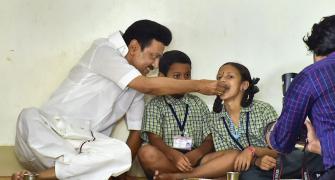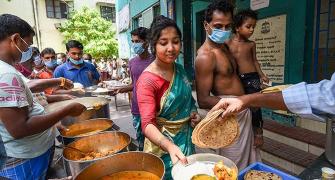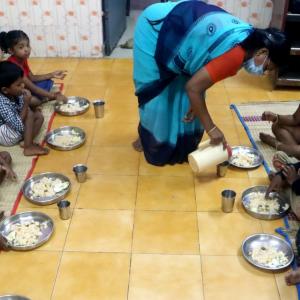'Within a short span, it increased attendance, improved children's physical fitness, and led to a rise in the enrolment ratio.'

Way back in 1920, the idea of mid-day meals at schools in Tamil Nadu was initiated by the Justice Party, widely considered to have ushered in the Dravidian movement.
It was introduced in one corporation school in the Thousand Lights area in Chennai then.
Later, after Independence, the Midday Meal Scheme was rolled out in 1957 in Tamil Nadu by then chief minister K Kamaraj.
However, the scheme had to wait several decades -- till 2002 -- to become nationwide. It happened only after the Supreme Court made it mandatory for states. The scheme was renamed PM Poshan in 2021.
And now, after more than six-and-a-half decades since the Kamaraj initiative, Tamil Nadu is again showing the way for the country with another social-sector scheme -- 'Chief Minister's Breakfast Scheme'.
Though launched on a pilot basis in September last year in 1,545 elementary schools, the scheme is being expanded to 30,122 government primary schools in the state from the coming academic year.
Announcing the expansion while presenting the Tamil Nadu Budget 2023, Finance Minister Palanivel Thiagarajan said Rs 500 crore (Rs 5 billion) was allotted for this scheme and it was going to benefit around 1.8 million students of classes 1 to 5 next year.
The government is spending around Rs 12.75 a day on every child as part of the breakfast scheme.
The menu includes a wide range of items, including rava upma, pongal, semiya upma and kesari. The menu also includes millets available in the area at least two days a week.
"Tamil Nadu is the first state to introduce a breakfast scheme and this is a revolution. It is a scheme that takes forward the Dravidian ideology, concentrating on the downtrodden in society. Within a short span, it increased attendance, improved children's physical fitness, and led to a rise in the enrolment ratio," said R Venkatesh, political analyst and faculty at the University of Madras.
The success of the first phase resulted in the government expanding the scheme.
It benefited 114,000 students during the first phase.
These included 417 schools in cities, 163 in towns or district headquarters, 728 in rural areas, and 237 in far-flung or hilly areas (totalling 1,545).
According to a study by the state planning commission, around 85 per cent of the schools (1,319) showed an increase in attendance during the first phase.
Experts also highlight this has resulted in bringing down childhood malnutrition.
Another major scheme in the education sector by the Stalin government that is getting attention is the Pudhumai Penn Scheme.
Under this, all girls in Classes 6 to 12 in government schools are provided Rs 1,000 per month for their higher education, which is benefiting around 220,000 girl students now.
"Whether it is the DMK or AIADMK, governments in Tamil Nadu lay emphasis on the social sector. Inspired by the Amma Unavagam, several such initiatives like Indira canteens and Atal canteens were implemented by other states. Similarly, the distribution of cycles to girl students and the free laptop scheme too got followers in other states," said Sumanth Raman, a political analyst.
Another scheme called Illam Thedi Kalvi, kicked off during the pandemic to cover the learning loss among students, turned successful.
As part of the programme, volunteers lead an outreach programme, providing learning close to students' homes.
During the pandemic, another scheme that captured attention was Makkalai Thedi Maruthuvam, which was offering door-to-door screening and drug delivery.
According to one estimate, more than 10 million people benefited from the scheme till December.
In the recent Tamil Nadu Budget, the state extended this to guest workers, covering 711 factories and 835,000 workers in the first phase.
Interestingly, the state has often been criticised for offering freebies like laptops, colour TVs, grinders, mixers, and fans to people.
However, experts say this has helped the state in its inclusive journey.
"Rather than looking at one government or one scheme, I think over the past 30-50 years, a series of welfare schemes has been launched. Some of them went overboard, like mixer grinder and TV. I still believe these schemes have been beneficial in reducing inequalities in society," Raman added.
The welfare programmes by various governments have resulted in an increase in the state's social sector spending from Rs 13,616 crore (Rs 136.16 billion) in 2003-2004 to Rs 1.23 trillion in 2021-2022, according to the Reserve Bank of India's statistics on state finances.
Of this, around Rs 69,398 crore (Rs 693.98 billion) was spent on urban development, Rs 35,564 crore (Rs 355.64 billion) on water and sanitation, and Rs 27,065 crore (Rs 270.65 billion) on health and family welfare.











